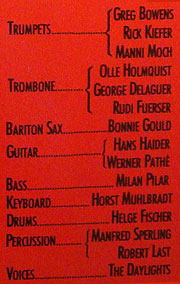The Kai Warner Sound
Extract from "Golden Melodies" CD liner notes written by Suitbert Kempkes
The first impression of the Kai Warner sound: an elegant, cultivated smoothness. The brass is
recorded in a way that doesn't attack the ears with sharpness
but comfortably snuggles to them. Kai Warner lets the trombone
cast important accents. Even more important are the alto
saxophones. In most cases, they lead the melody and tiptoe along
on soft paths, with lots of glissandi. Much of it reminds one of
the sax sound of the Americans Les and Larry Elgart.
With
his alto saxes, the Kai Warner sound differs a lot from the
James Last sound. But the Last brothers were never rivals. One
time, when James Last has to be hospitalized, Kai Warner takes
over his band for a TV appearance on the ZDF Starparade. Warner
always knows his brother's production schedule. Once three days
of recordings for a James Last album are in the can, three more
days are added for a Kai Warner album. The line-up is nearly the
same.
The
sax section consists of James Last musicians Karl-Heinz Lüer and
Harold Ende and members of the NDR Radio dance orchestra, like
Herb Geller and Hermann Manig. Studio musicians from Munich
usually travel to Kai Warner sessions as well. Among his
trombonists are Detlev Surmann, Ole Holmquist and Georges
Delagaye. Regulars among the trumpeters are Rick Kiefer, Bob
Lanese and, occasionally, trumpet star Horst Fischer.
Guitarist Ladi Geisler remembers today that Kai Warner always
had a secure feeling for progressions in the arrangements.
Therefore it is no wonder that many titles begin with a combo
sound. Besides Geisler, guitarist Bernd Stefanowski from Bremen
participates, Günter Platzek is heard with his jazzy piano and
the vibraphone and marimba sound comes from none less than
Wolfgang Schlüter from Hamburg. A mutuality with the James Last
sound of the sixties exists in sound and in the person of Robert
Last, the oldest of the Last brothers. This drummer, with his
unique way of playing fills, is heard on all of Warner's
productions from the sixties to the early seventies.

